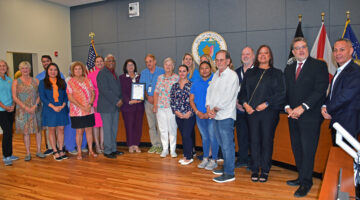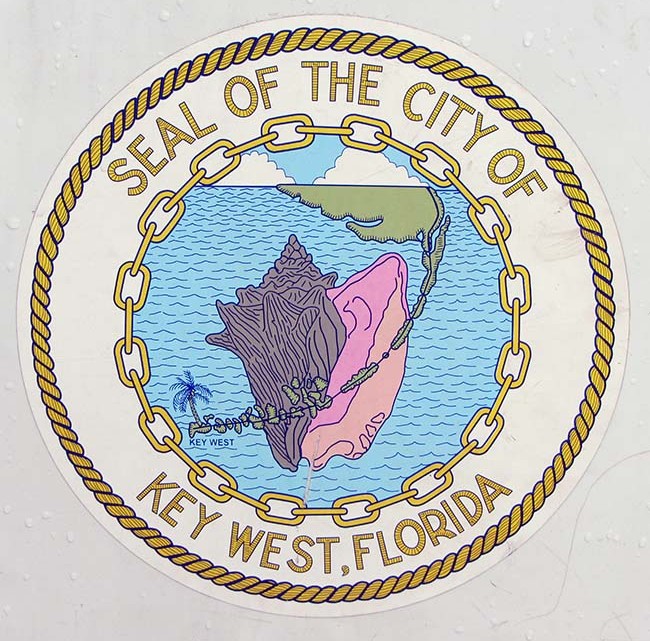Floating affordable housing project under pressure
BY PRU SOWERS
KONK LIFE STAFF WRITER
You might think it would be easy to build some badly-needed affordable housing in Key West these days. After all, the dearth of affordable rental units and reasonably priced houses and condominiums for sale has been the leading challenge in the city for years. The word “crisis” has been applied to this lack of housing and rightly so.
But for local developer Owen Trepanier and his business partner Eric Dickstein, a novel plan to use floating houseboats for affordable workforce housing along North Roosevelt Boulevard has been criticized and pummeled for the past two years. Despite multiple changes to the plan, including reducing the number of affordable rental houseboats from 74 to 30, Trepanier still doesn’t know if his development project will win approval from Key West City Commissioners on Aug. 6, when it comes up for a final vote.
“We’ve been working on this for two years. It’s been brutal,” Trepanier said. “The process, the bureaucracy they throw in front of affordable housing projects… it kills me.”
No new housing project in the city ever has smooth sailing. The building codes in Key West are numerous and complicated – rightly so – as they try to protect the city and its culture from overbuilding and a host of other construction sins. From the size of the project to the number of available parking spaces to landscaping, all get a look-over by numerous boards and commissions. But there are also neighbor and/or competitor efforts that try to derail a project, even one that attempts to create badly-needed affordable housing.
In Trepanier’s case, the complaints about his proposed workforce housing marina located between Fifth and Seventh streets along North Roosevelt began almost as soon as he announced the project. First, residents in a next-door upscale neighborhood developed by Pritam Singh chimed in, concerned about noise from a proposed clubhouse containing a restaurant and bar at the marina. Some residents were also worried that their water views would be obstructed. Trepanier and Dickstein agreed the residents had some legitimate concerns and changed the plan, including completely removing the proposed clubhouse.
“We just eliminated that stuff. We addressed every one of their concerns,” Trepanier said.
Next up was marina’s neighbor on the other side, Banana Bay Resort & Marina; a hotel badly damaged during Hurricane Irma and then sold to KW26 LLC, a company that is one of the largest operators of hotels and commercial real estate in North America, including the Margaritaville Key West Resort & Marina. Banana Bay is currently being rebuilt by the new owners and its attorneys were quick to complain about multiple issues, including parking and the impact of additional traffic on an already-busy main road.
“They voiced their opposition. They don’t want ‘those people’ next to them,” Trepanier said, referring to the reluctance of some people to live next to lower-income residents. “It’s NIMBY.”
“Our objections, I want you to know, are not founded at all on a NIMBY,” said one of Banana Bay’s attorneys, Ginny Stone, to the Key West Planning Board when it heard the project plan on May 16. “We have no problem with it being affordable housing. Our objections will be withdrawn when your parking on-site meets the demand created by the amount of development that you have on the property.”
The proposed marina, with its 30 new, manufactured houseboats, 40 recreational boating slips and existing commercial rental space, is 24 parking spaces short, based on city requirements. Trepanier applied for a parking variance, the same type of variance granted to the city-owned affordable housing project currently being built on College Road on Stock Island, but was denied by the city planning department. Trepanier then further reduced the size of the project to meet the parking needs, including cutting the number of total boat slips from 74 to 70, decreasing the square footage of leasable office space from 4,621 to 301 and completely eliminating 1,710 square feet of professional service floor area, another potential source of revenue for Trepanier’s project now gone. Despite those changes, the proposed available parking still does not meet city regulations. Bart Smith, another attorney representing Banana Bay, said that added traffic from both the new marina and the still-closed Banana Bay hotel must be included in any traffic study.
“They were not. The traffic study is deficient. It is going to be a major increase in traffic,” Smith told the planning board on May 16.
The city planning department agreed, recommending that the planning board deny the project. But despite concerns, the planning board voted 4-2 to recommend approval to the city commission. Their reason? Because the overwhelming need for affordable housing may require some compromises. Multiple speakers at the May planning board meeting made that case, including Melissa Trader, board chairwoman of the May Sands Montessori School, who described the school’s difficulties recruiting teachers despite plenty of qualified candidates.
“Our major issue is finding a place for them to live when they’re here,” she said.
Those arguments seemed to sway several planning board members.
“We should make reasonable accommodations where possible to achieve the common good,” said board member Ed Russo.
“We are beyond the crisis level of affordable housing here,” echoed board member Jim Gilleran.
It is now up to city commissioners, some of whom have concerns, as well. Mayor Teri Johnston said she needs to hear more in-depth information about parking, hurricane evacuation and marina management before she will be satisfied. But she applauded the out-of-the-box thinking Trepanier and Dickstein are showing in finding new solutions to provide affordable housing.
“We have a lot more water than we have land. If you go on that premise, it [the houseboat project] is appealing. We just have to get all the details,” she said.
Trepanier is trying to be optimistic about the chances of approval. But if city commissioners want additional reductions in the project scope, he doesn’t know if he can accommodate them.
“If it gets reduced further, it probably won’t make financial sense and we’ll drop it,” he said. Everybody’s talking about affordable housing. And here we’re willing to do it. At the end of the day, we’re building housing for working people.”
[livemarket market_name="KONK Life LiveMarket" limit=3 category=“” show_signup=0 show_more=0]




I don’t trust anything that Trepanier proposes. His motives are questionable and so are his clients. Beware!
GW, Owen Trepanier has been fighting for affordable housing for many years . There is no motives besides helping our community. I personally work for a company in Key West which had 20 employees . I am the only one left. Everyone is working remotely because of the cost of housing. Terri Johnson and commissioners please allow this project and others affordable housing projects. Our community desperately needs affordable housing.